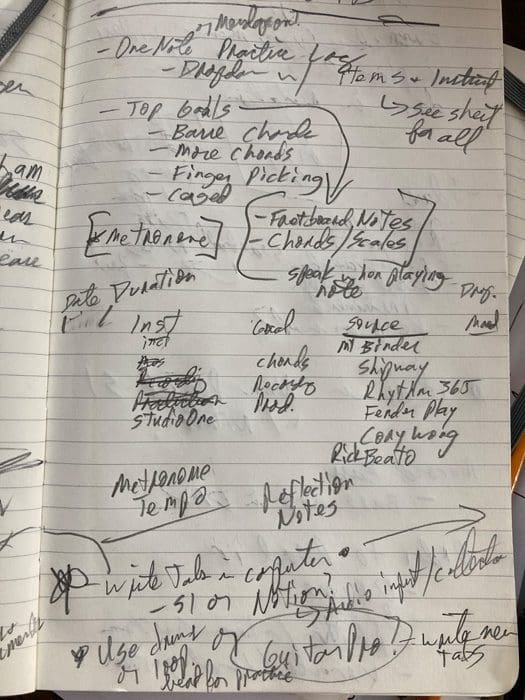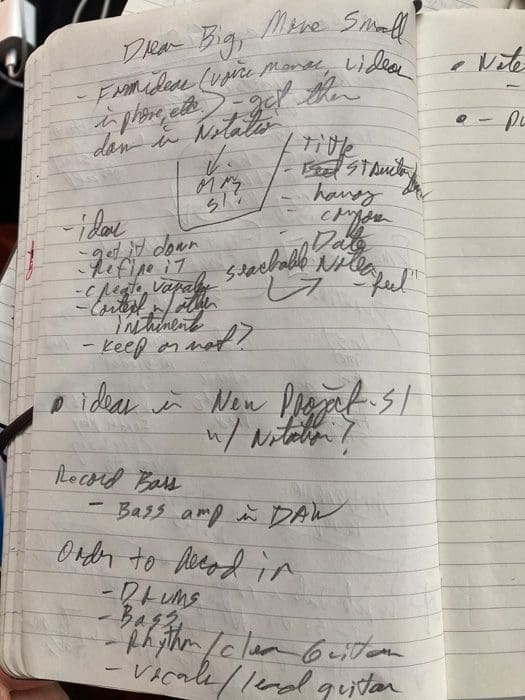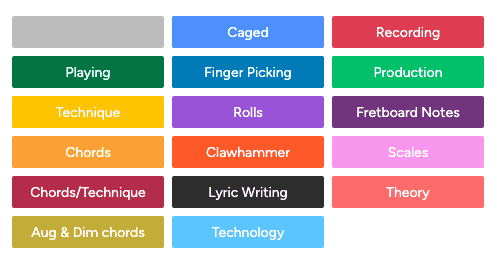As musicians and guitarists, we all know that practice is essential to becoming better at our craft. But I recently stumbled upon a book that completely changed my perspective on how I approach my practice sessions. This past weekend, I started reading How to Practice Guitar and Train Your Creativity by Sam Russell, and it has already made such a significant impact on how I view my guitar (and music) progress and creativity. Let’s dive into how rethinking the way we practice can lead to a fruitful music learning journey.
Making the Most Out of Your Practice Sessions
What sets Sam Russell’s take on practicing apart from others is his focus on developing a structured practice routine tailored to nurturing creativity and enhancing overall musicianship. Weaving cognitive learning into your practice can have a significant impact on your skill and creativity growth, both in the short and long term.
Start by identifying your strengths and weaknesses, setting short-term and long-term goals, and incorporating various aspects of cognitive learning into your practice routine. Remember that it’s essential to maintain a balance between structured practice and allowing space for spontaneity and experimentation in your sessions.
My Personal Experience
I found tremendous value in incorporating cognitive learning into my practice sessions. Since I started reading How to Practice Guitar and Train Your Creativity, I’ve not only noticed an improvement in my technical abilities but also a considerable boost in my creativity and enthusiasm for practicing.
By understanding and implementing the cognitive learning aspects in my daily practice routine, I have begun to genuinely enjoy my sessions and look forward to pushing my limits each time.
Whether you’re just starting your music journey or looking for ways to reignite your passion for playing guitar, consider exploring your cognitive learning capabilities. Understanding how our brain works and how we learn can be a game-changer in unlocking your true potential as a guitarist.
My Practice Journal
I’ve attached a couple pages of my notes from reading this book (good luck trying to read them). But basically I’ve worked up a template (in monday.com) that gives me columns by date, duration and metronome tempo. In addition, what instrument I’m working on (acoustic guitar, electric guitar, banjo, piano, or clarinet). I’ve also set dropdown selectors for my high-level goal and my practice source or where I’m learning from.
I also added a “Reflection Notes” section for my mood, struggles, successes, etc. I also started a short-term list of things to work on also. Things like that dreaded B chord and barre chords.




The Importance of Cognitive Learning
As musicians, it’s vital to understand that our brain plays a massive role in our capacity to learn new skills, concepts, and techniques when it comes to guitar playing. The book highlights the crucial aspects of cognitive learning that need to be integrated into our practice routine to get the desired results. The author talks about several critical aspects of learning effectively, which can make a massive difference in how we approach our guitar practice.
Learning Through Classical Conditioning
Classical conditioning is the process by which we learn to associate two stimuli with each other, leading to a change in our behavior. In the context of guitar practice, this means associating certain feelings, emotions, and mindsets with our practice sessions to make them more productive and enjoyable.
Learning Through Operant Conditioning
Operant conditioning refers to the process by which we learn through consequences, mainly rewards and punishments. By setting goals and rewarding ourselves when we achieve them, we reinforce positive habits and behaviors in our guitar practice sessions.
Extinctive Conditioning
Extinctive conditioning involves reducing or eliminating undesired behaviors or habits through a lack of reinforcement. In this context, it would mean identifying bad practice habits and gradually eliminating them by focusing on more productive techniques and mindsets.
Cognitive Challenges
Cognitive challenges are a crucial aspect of developing our guitar skills and creativity. These challenges include pushing ourselves to learn new techniques, exploring different genres, and setting increasingly difficult goals in our practice sessions.
So, take a moment to reflect on your current practice habits and make the necessary changes; remember that the process matters for learning. As you incorporate these techniques into your guitar practice, you’ll be amazed at the progress that you can achieve!
Happy learning and practicing!

